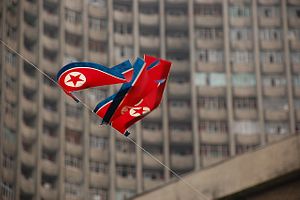The question of “who’s number two” in Kim Jong-un’s regime in North Korea has been blurry for some time, particularly since the dramatic late-2013 purge and execution of Kim’s uncle Jang Song-thaek. Since Jang’s demise, there have been several pretenders to that position. Now, it appears that one has formally risen above the rest.
Hwang Pyong-so, widely believed to be the front-runner to be North Korea’s “number two,” confirmed his claim to that title this week when he was given membership in the politburo presidium of North Korea’s Workers’ Party of Korea (WPK). This position, in addition to his status as the top political officer in North Korea’s military, makes him de facto second-in-command to Kim. Hwang’s ascent to the politburo presidium should end speculation on this topic.
Hwang’s name was in the news last fall when, with Choe Ryong-hae and Kim Yang-gon in tow, he arrived in Incheon, South Korea on a surprise visit at a time when Kim Jong-un was conspicuously absent from the North Korean political scene. Kim’s absence provoked speculation of a power struggle, illness, and worse. Hwang’s participation in that visit was an additional detail in his favor when it came to claiming the title of North Korea’s second most powerful man.
Choe and Kim Yang-gon are still high up on the ranking of North Korean power players. Choe served Kim Jong-il as a close military aide and was one of the names mentioned after Jang’s death as the new regime number two. Kim Yang-gon, meanwhile, is director of North Korea’s United Front Department, the effective analog in Pyongyang to South Korea’s Unification Ministry.
In spring 2014, Choe lost out to Hwang when the latter was promoted to the directorship of the Korean People’s Army General Political Bureau. Later in the year, Hwang also took over as vice chairman of North Korea’s powerful National Defense Commission. Choe is also a member of the politburo presidium, along with Kim Jong-un and Kim Yong-nam. The Diplomat covered the back-and-forth between Choe and Hwang last year when both men’s precise standing within the regime was unclear, with Choe briefly being perceived as superior to Hwang.
According to North Korea Leadership Watch, a site devoted to tracking senior personnel in the North Korean state apparatus, Hwang is “responsible for the political management (personnel decisions, surveillance, patronage) of the DPRK’s conventional military forces as well as its political education and cultural activities.” He is additionally a “member of the Korean Workers’ Party [KWP] Central Military Commission, the KWP Political Bureau, a deputy to the 13th Supreme People’s Assembly, a member of the Party Central Committee and holds the military rank Vice Marshal.”
































